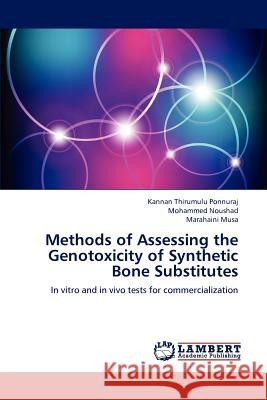Methods of Assessing the Genotoxicity of Synthetic Bone Substitutes » książka
Methods of Assessing the Genotoxicity of Synthetic Bone Substitutes
ISBN-13: 9783659185496 / Angielski / Miękka / 2012 / 92 str.
Artificial biomaterials are being used for the treatment of various diseases since the past two millenniums. Synthetic bone grafts have gained acceptance as popular functional biomaterial substitutes. However, the concerns on the possible toxic effects produced by these bone substitutes in the human body are continuing. As such, it becomes imperative that the genotoxicity of these bone substitutes be assessed prior to commercialization. Evidently, there is no single test for ascertaining the complete lack of genotoxicity. On the other hand, it appears redundant to carry out all the recommended tests for certifying biomaterial acceptability. The discretion of the choice of tests for genotoxicity lies solely with the researcher. The decision on the choice is made considering the purpose for which it is intended, the nature of contact as well as the duration of implantation. This book is a compendium highlighting the principles and methods of different genotoxicity tests, both in vitro and in vivo involving synthetic bone substitutes, which, it is hoped, would enable the researchers in identifying appropriate tests of their interest.
Artificial biomaterials are being used for the treatment of various diseases since the past two millenniums. Synthetic bone grafts have gained acceptance as popular functional biomaterial substitutes. However, the concerns on the possible toxic effects produced by these bone substitutes in the human body are continuing. As such, it becomes imperative that the genotoxicity of these bone substitutes be assessed prior to commercialization. Evidently, there is no single test for ascertaining the complete lack of genotoxicity. On the other hand, it appears redundant to carry out all the recommended tests for certifying biomaterial acceptability. The discretion of the choice of tests for genotoxicity lies solely with the researcher. The decision on the choice is made considering the purpose for which it is intended, the nature of contact as well as the duration of implantation. This book is a compendium highlighting the principles and methods of different genotoxicity tests, both in vitro and in vivo involving synthetic bone substitutes, which, it is hoped, would enable the researchers in identifying appropriate tests of their interest.











